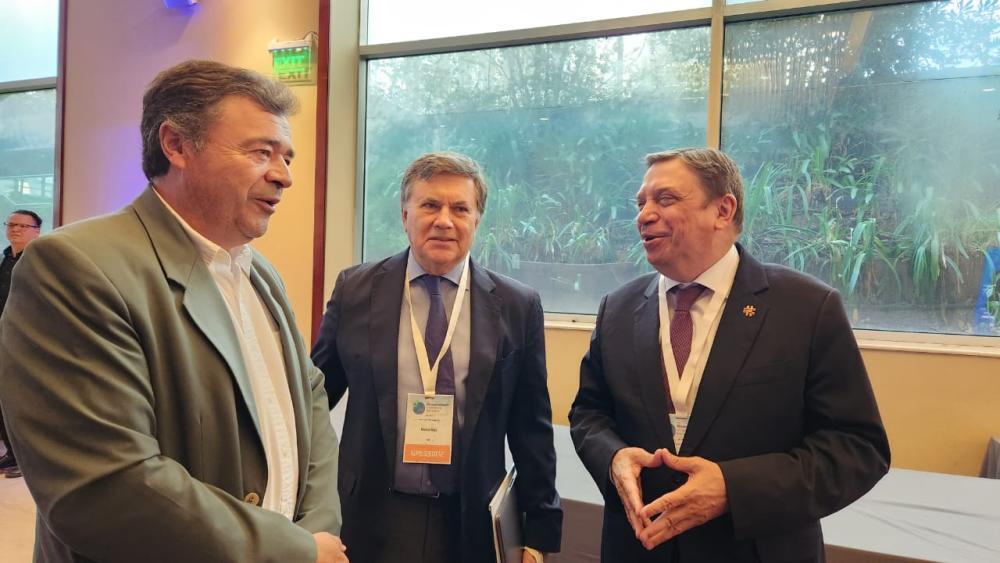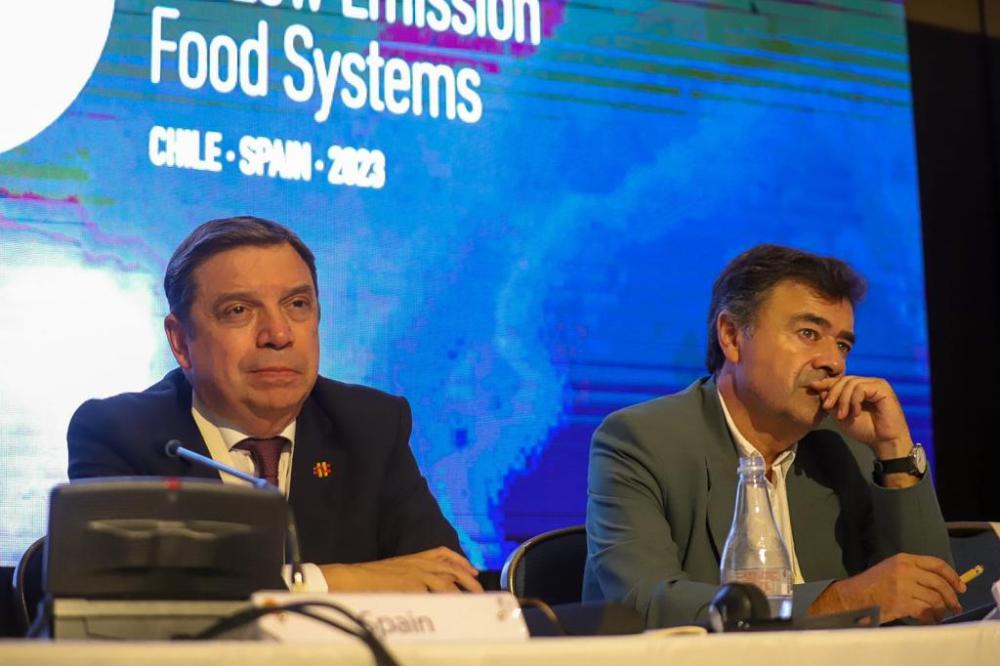At an international conference in Chile, with IICA in attendance, ministers stressed the agriculture sector’s commitment to increased food production and sustainability

Santiago, Chile, 17 April 2023 (IICA) – Representatives from 24 countries of the five continents, attending the First Ministerial Conference on Low-Emission Food Systems in Santiago, maintained that the agriculture sector is committed to generating increasingly more food for the world, through good practices that also contribute to mitigating climate change.
Chilean president Gabriel Boric gave his support to the meeting, which sought to position agriculture as a relevant sector to offer innovative solutions for the climate crisis.
Boric said that achieving food security is one of the greatest challenges for Latin America, while mentioning the importance of innovation, new technologies and training to build a more sustainable agriculture sector.
The conference focused on stimulating international cooperation to reduce emissions of methane, one of the greenhouse gases (GHGs) that causes climate change. At the 2021 United Nations Climate Change Conference in Glasgow (COP26), over 100 countries took on the commitment to reduce global methane emissions by 30 percent by 2030, and at the same time generate the conditions for greater resilience in food systems.
“This is a historic moment, with representatives from the five continents speaking up about the importance of reducing methane emissions in agriculture, which will help to reduce climate change effectively”, said the Chilean Agriculture Minister Esteban Valenzuela, who was co-chair of the event along with the Spanish Minister of Agriculture, Fisheries and Food Supply, Luis Planas.
“The question is whether we can achieve a perfect triangle: produce more food, with less stress on the environment, and with responsible water use. This is our obligation”, Valenzuela added.
The Conference had the support of the Inter-American Institute for Cooperation on Agriculture (IICA), represented by its Director General, Manuel Otero.
Minister Planas said that the health of ecosystems, human wellbeing and sustainable development are issues that are closely related to each other and it is not possible to advance in any one of them separately, but rather as a whole.
The Spanish minister said the agriculture sector must adapt to a new context, insisting that, “We must think about what instruments and technologies are capable of responding to current food production needs. That is why it is important to recognize the value of various forms of knowledge and research. We are faced with the challenge to nourish and provide food for a growing population, using limited natural resources and reducing the impact on the environment”.
Also present was the Uruguayan Minister for Livestock, Agriculture and Fishing, Fernando Mattos, who praised the initiative of his Chilean counterpart in bringing to the table a key debate for the agriculture sector.
“First, I would like to congratulate the minister from Chile and all his team for putting forward such an important issue as reducing emissions from agriculture. This is crucial for the future of our work and our countries, which have a vocation for agricultural production”, said Mattos.
He added: “We are increasingly vulnerable to extreme events like droughts, floods and fires, all climate catastrophes that are not generated by the agriculture sector, but rather by the consumerism of developed countries. Nonetheless, we have to take on the commitment to improve our environmental performance to mitigate the effects of climate change”.
In this aspect, Uruguay has taken important steps, given that most of the country’s livestock grazes on natural pastures, which provides a considerable level of carbon sequestration. Uruguay has also implemented a system to calculate emissions per hectare and per kilo of meat produced – a tool that has confirmed that natural fields are capable of capturing carbon.
IICA’s Director General mentioned the need to identify concrete, practical solutions so that countries can reduce methane emissions through their public policies, maintaining and increasing productivity sustainably for the entire planet, which will reinforce food security and consequently peace.
In this regard, he said that one urgent challenge is the reduction of methane emissions, especially in livestock and rice production chains.

“The transformation that is already underway means that we cannot delay laying the bases for a low-emission agriculture sector. The agriculture of the future, which is already here, must be sustainable or it will not be agriculture”, he said.
Otero gave details of actions implemented by IICA in different countries of the Americas to reduce methane emissions in rice and livestock farming.
Nonetheless, IICA’s Director General stated that livestock production is often unjustifiably criticized when it comes to the issue of climate change.
“I want to put up a defense of this productive chain that has been unfairly blamed,” he said, “forgetting that this is a sector that almost always operates in marginal areas, does not compete with other chains and plays a social role”.
“Livestock farming is undergoing many transformations, as it tries to achieve greater efficiency through genetic breeding, the integration of agrosilvopastoral systems and the improvement of pastures, among other practices”, he added.
Otero concluded by stressing the utmost importance of the role of farmers, irreplaceable figures in food security.
“We want farmers to produce food, but also to be providers of ecosystem services, guardians of biodiversity and protectors of their rural territories. We have to give them the importance that they deserve, so that they can play a leading role in their own transformation”.
More information:
Institutional Communication Division.
comunicacion.institucional@iica.int